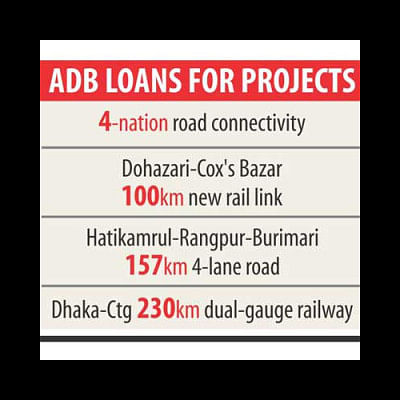ADB to double lending to Bangladesh

The Asian Development Bank will more than double its lending to Bangladesh over the next three years, attaching priority to connectivity projects linking the country to India, Nepal and Bhutan.
Bangladesh is likely to receive $5.9 billion between 2016 and 2018, in contrast to $2.68 billion between 2013 and 2015.
The decision comes after a month-long discussion, led by ADB Country Director Kazuhiko Higuchi, with senior officials from the Economic Relations Division and a number of ministries and divisions. The discussions concluded yesterday.
The ERD officials got the impression from the meetings over the past month that the multilateral lender was keen on bankrolling connectivity projects, given the recent push for regional cooperation among Bangladesh, Bhutan, India and Nepal or BBIN.
During the discussions, the ADB identified several connectivity projects, including five roads and railways.
On June 15, the four countries signed the Motor Vehicle Agreement in Thimphu for seamless transit of passenger, cargo and personal vehicles.
"I am very impressed with your genuine desire to liberalise cross-border transport of cargo and passengers, to promote freer trade and economic exchanges," ADB Vice-president Wencai Zhang said at the agreement signing ceremony.
The ADB will support the ongoing road connectivity projects in each of the four countries through the South Asia Subregional Economic Cooperation (SASEC) programme, he said.
The projects will upgrade and complete transport routes that broadly cover Saarc corridors 4 and 8, and will also include facilities to enhance cross-border activities, such as access roads, dry ports and land customs stations.
SASEC member countries have concrete plans to continue building and upgrading regional physical connectivity.
For the next five years, 30 priority road projects totalling over $8 billion have been identified to fill and upgrade critical connections in the BBIN area, he said.
However, to maximise the benefits of increased connectivity, it is important for the four countries to implement appropriate transport facilitation measures, Zhang said.
In 34 individual and sub-regional projects, the bank has provided $6.51 billion, of which Bangladesh received $2.72 billion in 17 projects, according data from ADB.
Zhang said the planned BBIN agreement will address many of the non-tariff barriers that drive up the cost of trade, by providing a framework for exchange of commercial traffic rights arrangements.
A 2014 JICA study calculated the benefits of such arrangements for the BBIN countries. "The bottom line is that every country has much to gain, regardless of its position in the road corridors," Zhang added.
The Manila-based lender in the study 'Connecting South Asia and South-east Asia' said Bangladesh will need a total of $13.76 billion to ensure smooth connectivity through road, rail and port.
Meanwhile, ADB in its country strategy for the next three years said it wants to scale up programmes and larger projects over the next three years.
The bank will focus on major sectors including energy, power and rural infrastructure and support rail and road transport network to develop regional connectivity, it said in the proposal.

 For all latest news, follow The Daily Star's Google News channel.
For all latest news, follow The Daily Star's Google News channel. 




Comments